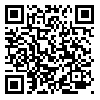BibTeX | RIS | EndNote | Medlars | ProCite | Reference Manager | RefWorks
Send citation to:
URL: http://irje.tums.ac.ir/article-1-5687-en.html
2- اپیدمیولوژیست، مرکز تحقیقات بیماری های کلیوی و مجاری ادراری، دانشگاه علوم پزشکی شهید بهشتی، تهران و بخش اپیدمیولوژی و آمار زیستی انستیتو پاستور ایران، تهران، ایران
3- دانشجوی دکتری تخصصی پژوهشی محور، مرکز تحقیقات مدلسازی در سلامت، پژوهشکده آینده پژوهی در سلامت، دانشگاه علوم پزشکی کرمان، کرمان، ایرن
4- دانشیار اپیدمیولوژی، بخش اپیدمیولوژی و آمار زیستی، مرکز تحقیقات بیماریهای نوپدید و بازپدید، انستیتو پاستور ایران، تهران، ایران ,
Background and Objectives: Internet addiction is a social-physiological event with emotional disturbance, depression, and disruption of social relationships. In addition, Internet addiction has a negative effect on the efficacy of the affected people. The aim of this study was to determine the prevalence of Internet addiction in students and graduates of medical sciences.
Methods: This cross-sectional study was conducted on the sideline of epidemiology, microbiology and pediatric diseases congresses from May to October 2013. The participants included the students and graduates of epidemiology, clinical sciences, and other basic sciences from all medical universities of throughout Iran. The Young’s addiction questionnaire was used to assess Internet addiction.
Results: One hundred and thirty one students and graduates with a mean age 36.1 (±8.4) years participated in this study. The prevalence of mild and moderate Internet addiction was 61.83% (95% CI: 40.53, 70.26) and 26.95% (95% CI: 26.95, 33.56), respectively. None of the participants suffered from severe Internet addiction.
Conclusion: Severe Internet addiction was not observed in our study. However, a high proportion of the participants had mild and moderate Internet addiction. Therefore, many participants may be at risk of severe addiction. It seems that planning for preventive measures, especially in academic groups, is necessary.
Received: 2017/06/12 | Accepted: 2017/06/12 | Published: 2017/06/12
| Rights and permissions | |
 |
This work is licensed under a Creative Commons Attribution-NonCommercial 4.0 International License. |





